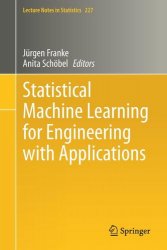Statistical Machine Learning for Engineering with Applications
- Добавил: literator
- Дата: 11-10-2024, 15:25
- Комментариев: 0
 Название: Statistical Machine Learning for Engineering with Applications
Название: Statistical Machine Learning for Engineering with ApplicationsАвтор: Jürgen Franke, Anita Schöbel
Издательство: Springer
Год: 2024
Страниц: 393
Язык: английский
Формат: pdf (true)
Размер: 17.9 MB
This book offers a leisurely introduction to the concepts and methods of Machine Learning. Readers will learn about classification trees, Bayesian learning, neural networks and Deep Learning, the design of experiments, and related methods. For ease of reading, technical details are avoided as far as possible, and there is a particular emphasis on applicability, interpretation, reliability and limitations of the data-analytic methods in practice. To cover the common availability and types of data in engineering, training sets consisting of independent as well as time series data are considered. To cope with the scarceness of data in industrial problems, augmentation of training sets by additional artificial data, generated from physical models, as well as the combination of Machine Learning and expert knowledge of engineers are discussed.
Machine Learning as a whole and, in particular, statistical learning have become a major tool in engineering research and industry during the last two decades, first on a small scale and in the recent past in more and more settings. It allows to use the large amount of information from the construction of production plants and from measurements of process parameters to achieve considerable improvements in product quality and in production time and costs.
This book is dedicated to statistical learning in engineering applications. Its main purpose is to introduce engineers to this exciting new area without requiring more than the most basic training in mathematics and statistics, which usually is part of the engineering education. On this level, it is also of interest for students of Data Science or related disciplines as a first primer on statistical learning with a focus on ideas and not on technical details.
In the first part, a short leisurely introduction to statistical learning as a part of Machine Learning, particularly important for industrial users, is given. Here, the focus is on the main ideas and concepts as well as on the prerequisites and the limitations of the methods. We also provide a review of common models and algorithms, but we do not discuss the computational problems of implementing learning methods as we expect engineering users to apply ready-made software packages, which are now widely available, respectively, to hire specialists in more complicated situations. In the latter case, good communication between data scientists and engineers is crucial for success, and the first part of the book will provide a common basis for this interchange.
The second part of the book presents case studies in applications of statistical learning from projects with industry from the Fraunhofer Institute of Industrial Mathematics (ITWM). They illustrate the complexity of real-world problems occurring in industry which differ in several respects from the famous standard applications of Machine Learning in the recent past, where the main difference is often the relative scarcity of data on the one hand, but the presence of sound engineering expertise on the other hand.
As a software, we use basic MATLAB and its toolbox Statistics and Machine Learning. For readers who, for the first time, are interested in applying statistical learning procedures themselves, we would recommend as a starting point R or Python due to the large variety of ready-made routines instead.
The methodological exposition is accompanied by several detailed case studies based on industrial projects covering a broad range of engineering applications from vehicle manufacturing, process engineering and design of materials to optimization of production processes based on image analysis.
The focus is on fundamental ideas, applicability and the pitfalls of Machine Learning in industry and science, where data are often scarce. Requiring only very basic background in statistics, the book is ideal for self-study or short courses for engineering and science students.
Скачать Statistical Machine Learning for Engineering with Applications
Внимание
Уважаемый посетитель, Вы зашли на сайт как незарегистрированный пользователь.
Мы рекомендуем Вам зарегистрироваться либо войти на сайт под своим именем.
Уважаемый посетитель, Вы зашли на сайт как незарегистрированный пользователь.
Мы рекомендуем Вам зарегистрироваться либо войти на сайт под своим именем.
Информация
Посетители, находящиеся в группе Гости, не могут оставлять комментарии к данной публикации.
Посетители, находящиеся в группе Гости, не могут оставлять комментарии к данной публикации.
